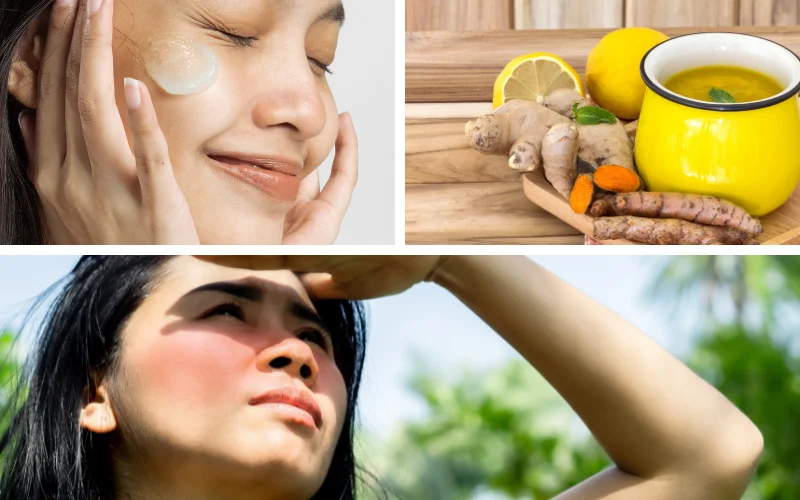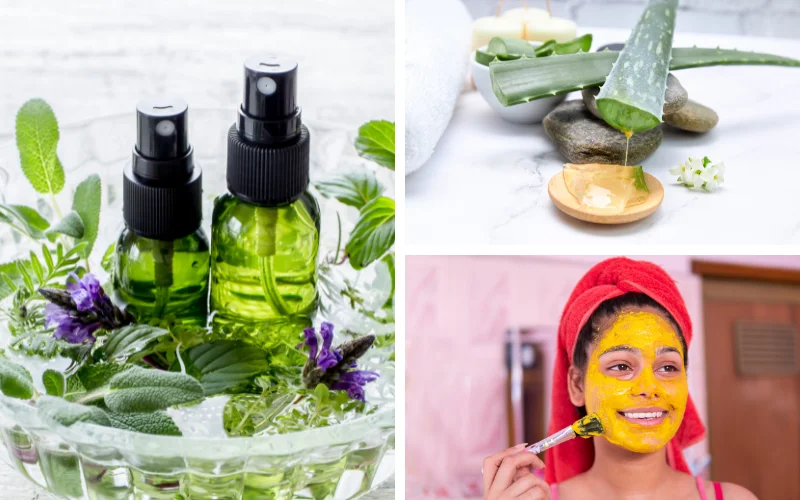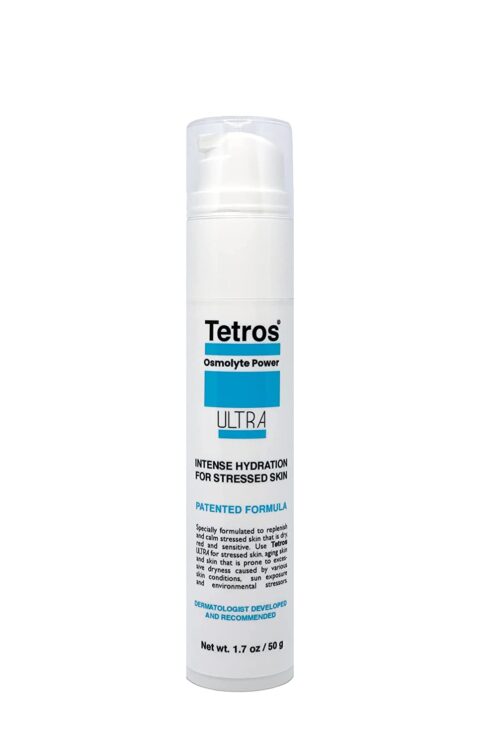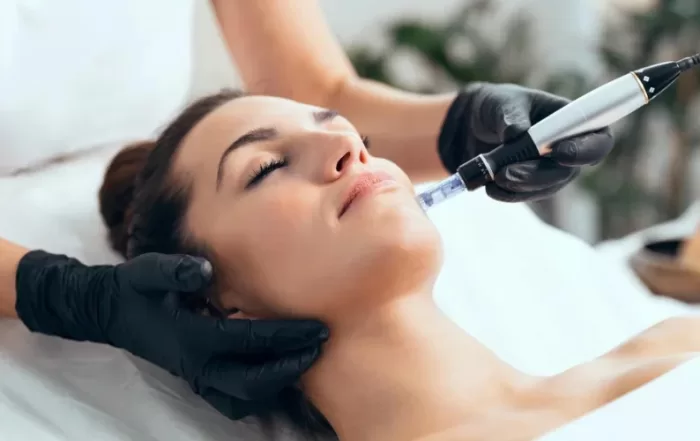When incorporated into basic skin care routines such as Tetros® ULTRA cream and sun protection, herbs can help to naturally rejuvenate your skin, promoting radiant skin with restorative powers. Utilized for millennia, many botanicals are celebrated for their ability to treat various skin problems. When applied topically, herbal remedies can soothe inflammation, fight bacteria, moisturize, and aid in healing wounds. For those with allergies or sensitivities, topical products containing herbal ingredients may provide a gentler alternative to conventional over the counter and prescription skin treatments.
A diverse array of herbs tackles common skin concerns such as acne, eczema, and sunburn. Even if you have clear and calm skin, incorporating herbs into your skin care regimen may help improve its overall tone and texture. Below, I’ll explore some top herbs renowned for their benefits to the skin.
Benefits Of Herbs For Skin Health
Integrating herbs into your skincare routine can significantly enhance skin health, appearance, and resilience. Here are some of the key benefits that can be obtained when using herbs for the skin:
- Moisturization: Helps to hydrate the skin and maintain the moisture barrier to prevent dryness and soften skin.
- Anti-Inflammatory Effects: Helping to reduce skin irritation, redness, and symptoms of skin conditions like eczema and psoriasis.
- Antioxidant Protection: Helping to shields skin from environmental stressors, UV radiation, and pollution by neutralizing harmful free radicals.
- Natural Antimicrobial Properties: Preventing acne breakouts and reduces skin infections with antibacterial and antifungal effects.
- Enhanced Healing: Helping to accelerate the skin’s healing process for minor cuts, bruises, and burns.
- Improved Skin Texture and Tone: Regular use may lead to more radiant, even-toned skin and reduced hyperpigmentation.
- Stimulating Collagen Production: Helping to promote skin elasticity and firmness, reducing forehead wrinkles and fine lines.
- Regulating Oil Production: Ideal for oily skin, helping to manage sebum production and prevent pore clogging.
- Soothing Sunburn: Offers relief and healing for skin after excessive sun exposure,
- Natural Exfoliation: Gently removes dead skin cells, promoting a healthy, glowing complexion.
10 Herbal Winners for Healthy Skin
Herbs have powerful anti-inflammatory, antioxidant, and antimicrobial properties that can help reduce inflammation, fight free radicals, and support the health of the skin cells. The top ten include.
Aloe Vera: The Super Soother
Aloe vera is known best for its soothing properties and is rich in antioxidants and vitamins that may aid in collagen production, promoting skin elasticity and reducing the appearance of wrinkles.
Turmeric: An Antioxidant Powerhouse
Turmeric contains curcumin, a potent antioxidant that fights free radicals and reduces inflammation. Its antibacterial properties help prevent breakouts and can lighten hyperpigmentation, improving the complexion.
Incorporating turmeric into skincare products or DIY masks can enhance your skin’s radiance and health.
Tea Tree Oil: The Breakout Buster
Tea tree oil is an effective treatment for acne as it possesses antibacterial and anti-inflammatory properties. It functions by cleansing the pores, dehydrating whiteheads, blackheads, and pimples, and stopping the occurrence of subsequent breakouts. A small quantity of tea tree oil can be mixed with moisturizers or applied directly to the skin using carrier oil.
Calendula: The Skin Healer
Calendula, with its vibrant flowers, is not just a visual delight but a skincare marvel. It accelerates wound healing, soothes dryness, and reduces inflammation, making it beneficial for psoriasis, blotchy skin, and eczema. Calendula-infused skincare products can help improve the overall appearance and health of the skin.
Witch Hazel: The Pore Minimizer
Witch hazel is a natural astringent that can tighten the skin and reduce the size of pores. It also helps control oil production and soothe irritation, making it a great addition to skincare routines aimed at combating acne ruddy skin and improving complexion.
Neem: The Skin Protector
Neem is revered for its antiseptic, antifungal, and anti-inflammatory properties. It can help treat various skin issues, including acne, Crepey skin, psoriasis, and eczema. Neem leaves can be pasted or infused with oils to create healing skincare solutions.
Plantain: The Collagen Booster
Plantain leaves are rich in allantoin, which stimulates collagen production, enhances the skin’s texture, and promotes wound healing. Its antimicrobial properties also help treat acne and soothe irritated skin.
Yarrow: The Complexion Enhancer
Yarrow is known for its ability to heal the skin, reduce inflammation, and improve the complexion. Its astringent properties make it excellent for tightening the pores and controlling sebum production, leading to clearer, healthier skin.
Marigold: The Wrinkle Reducer
Marigold (not to be confused with Calendula, often called Pot Marigold) contains lutein. This powerful antioxidant protects the skin from sun damage and promotes collagen production, thus reducing the appearance of fine lines under the eye and maintaining the skin’s youthful elasticity.
Burdock: The Detoxifier
Burdock root is rich in antioxidants and compounds that detoxify the blood, leading to healthier skin. It can help reduce breakouts and improve skin texture, making it a valuable ingredient in skincare products.
Conclusion
Herbs offer a treasure trove of benefits for skin health, backed by centuries of use in traditional healing practices. You can address various skincare issues naturally and effectively by harnessing the power of plants like aloe vera, turmeric, tea tree, and Calendula. Embrace the healing power of herbs and let your skin reveal its natural beauty and radiance.
Frequently Asked Questions
Are There Any Side Effects To Using Herbs On My Skin?
While herbs are generally safe for topical use, some individuals may experience allergic reactions or sensitivity to certain herbs. It’s important to perform a patch test before using a new herbal product or home remedies, especially if you have sensitive skin.
Can I Use Any Herb For My Skin Type?
Various herbs have different benefits for multiple skin types and concerns. For instance, aloe vera is perfect for hydrating dry skin and is suitable for all skin types. On the other hand, tea tree oil is best suited for oily or acne-prone skin due to its antibacterial properties.











Leave A Comment